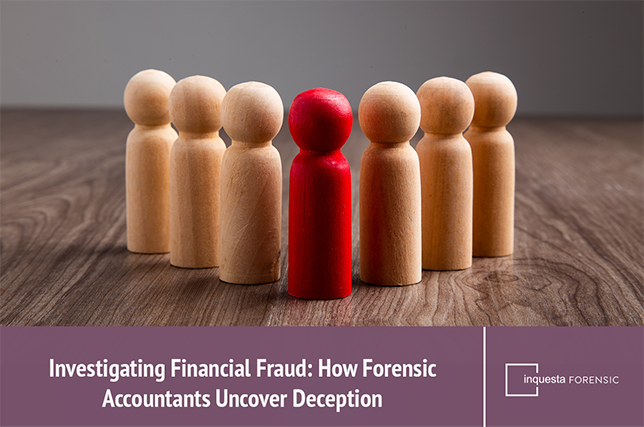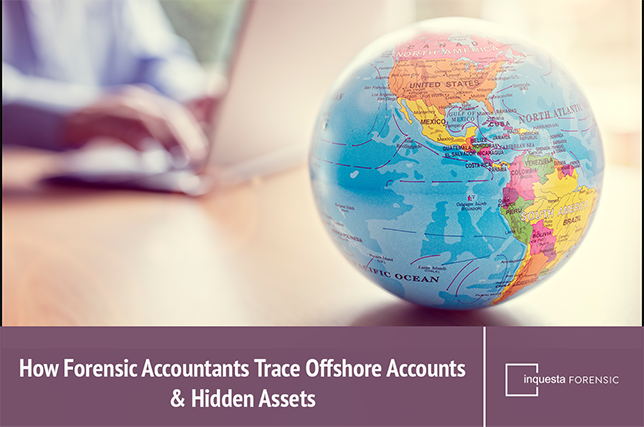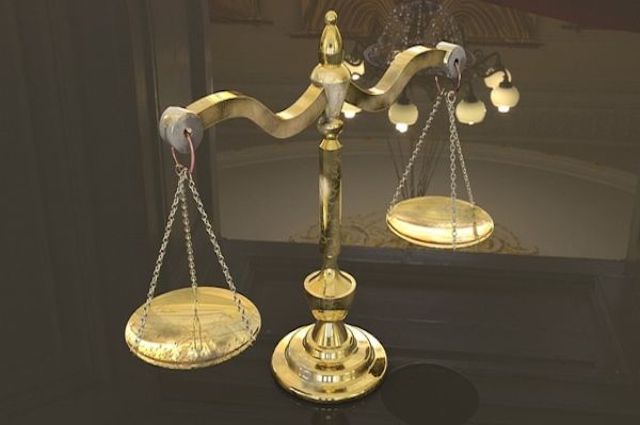While transparent financial disclosure is critical to a fair separation process, it’s possible that one party may attempt to hide or understate/undervalue their financial position in an attempt to achieve a more favourable settlement. Fraud in divorce has the potential to impact the rest of a person’s life post-separation, so it’s important that it is treated with the seriousness it deserves.
However, a spouse hiding money and assets during separation represents a significant challenge for the legal professionals tasked with ensuring a fair settlement can be reached. To uncover such behaviour will likely require dedicated forensic support from a specialist.
In this blog, we unpack the critical issue of fraud in divorce, exploring full financial disclosure in divorce in the UK, as well as the ways a spouse hiding money can compromise your settlement. We’ll also reveal how forensic accountants uncover hidden assets, explain the legal consequences of improper financial disclosure in divorce, and provide key insights to protect your financial assets during the separation process.
What Is Financial Fraud in Divorce?
Financial fraud in divorce occurs whenever one party deliberately attempts to mislead the other, or the court, regarding their monetary circumstances.
This can involve:
- Concealing income or assets (hidden assets in divorce).
- Underreporting the valuation of a business.
- Transferring money to third parties in order to deceive.
- Overstating debt in order to mislead.
- Failing to disclose offshore accounts or trusts.
As per UK law, full financial disclosure in divorce is a necessity. This is considered particularly important when looking to obtain a financial order from the court — where accurate information is key to ensuring a fair outcome for all involved.
Common Ways Assets Are Hidden During Divorce
Fraud in divorce can come in a number of guises; there are a number of common tactics utilised by spouses to conceal assets or otherwise manipulate their financial situations during the course of a divorce. This can range from transferring assets to friends or family prior to filing for separation, to using offshore accounts in an attempt to conceal assets.
Methods people use to hide assets and commit fraud in divorce include:
- Transferring Assets to Friends & Family: One of the most common ‘tricks of the trade’ is to transfer ownership of high-value assets (vehicles, jewellery, shares, etc.) to another party temporarily. These assets are often returned once the divorce process is complete.
- Undervaluing a Business: Company owners may look to understate their income, or delay new contracts/business, to make their company appear less profitable, downplay their benefit, and limit its stated value. It’s even possible that false liabilities can be created to further undervalue the company.
- Cash Withdrawal or Stockpiling: Some individuals may look to withdraw significant sums of money, or attempt to stockpile valuable assets and funds in secure locations (safes, storage units, secret bank accounts, hidden cryptowallets, etc.) in order to keep them from financial disclosure.
- Delaying Bonuses/Commissions: If an individual is expecting a significant bonus or commission from work, they may speak to employers to attempt to defer these payments until the financial settlement is complete.
- Utilising Offshore Accounts: More common in high-value separations, individuals may look to use offshore accounts, trusts, shell companies, or overseas trusts to further conceal the true extent of their funds. This makes it significantly more difficult to trace the true wealth of the individual — at least without specialist intervention and investigation.
The Importance of Full Financial Disclosure for a Divorce in the UK
As per UK family law, both parties in a divorce are required to complete a Form E financial disclosure divorce document. This form requires key details surrounding assets, property, business interests, pensions, debts and liabilities, and more.
If either party were to fail to properly disclose this information during the process, the court would be eligible to set aside any financial orders based on the false information provided. Additionally, according to the Matrimonial Causes Act 1973, courts do have the power to revisit settlements if non-disclosure or fraud is later suspected or discovered.

Warning Signs Your Spouse is Hiding Money
From missing documents or a reluctance to provide full financial disclosure in divorce, to discrepancies between bank statements and income claimed — if you suspect financial deception or fraud in your divorce, it’s important that you contact an expert immediately. Doing so will help to maximise your protection as you enter this critical next chapter of life.
Warnings signs your spouse is hiding money include:
- Sudden and unexplainable changes to expected lifestyle.
- Key documents going missing.
- A reluctance to provide full financial disclosure in divorce.
- Discrepancies being present between their bank statements and income claims.
- Unusual business activities (a drop in revenue or expenses that don’t align with trends or expectations).
- Unexplainable fund transfers.
While some of the signs your spouse is hiding money could be explainable, and they may be nothing to worry about, they can also point to serious issues that require further investigation. When it comes to fraud in divorce, it’s much better to be safe than sorry — after all, your settlement can have a tangible impact on the rest of your life.
Despite divorce rates being expected to decline between now and 2050, it’s still as vital as ever to remain vigilant in identifying any of the warning signs of fraud in divorce — to expose hidden assets and financial deception of any kind.

The Role of a Forensic Accountant in Divorce Cases
Fraud in divorce is where forensic accountants can play a vital role. Specially trained in analysing the most complex and hard to digest financial data, they can utilise a unique blend of accounting, investigation, and auditing skills in order to uncover any hidden assets and fraud in divorce.
How a Forensic Accountant Can Help You With Fraud in Divorce
- Trace hidden bank accounts.
- Follow the flow of funds to locate transaction sources/destinations.
- Thoroughly investigate and accurately value business interests.
- Analyse individual tax returns, bank statements, accounting records, etc.
- Identify any possible warning signs or discrepancies in spending and income.
- Acting as an expert witness — presenting found evidence in court in a digestible and understandable manner.
In high-net-worth or contentious divorces, the testimony of a specialist forensic accountant can be key to achieving a fair financial outcome for all — including any dependents that may be present.
Consequences for Non-Disclosure and Financial Deception
In England and Wales, failure to disclose your assets during divorce proceedings is not only considered unethical — it can carry serious penalties. These range from overturning a previously agreed financial order, ordering the fraudulent party to pay legal costs, and in severe cases of fraud in divorce, prosecution could be possible.
Beyond immediate legal repercussions, non-disclosure can also have long-lasting implications on both a personal and financial level. As a general rule, courts take a poor view of any attempts at deliberate financial deception — particularly if it has the potential to impact:
- Future financial settlements
- Child arrangements
- Professional reputation
Moreover, the emotional toll of navigating such complex and fraught matrimonial disputes can also be significant, further underscoring the importance of transparent and honest financial disclosure at all times during divorce proceedings.

Why Early Intervention Is Critical
When it comes to fraud in divorce and a spouse hiding money, the sooner you involve a specialist forensic accountant the better — and the more effectively they can protect your financial interests and ensure frank and full financial disclosure in divorce.
Early red flag detection and document/data analysis can give you and your legal team a significant advantage going forward. Ultimately, it’s important to remember: when it comes to hidden assets and fraud in divorce, the burden of proof falls on the party making the allegations. As a result, the sooner you intervene and approach an expert, the stronger your evidence will be, and the more likely you are to obtain a fair outcome.
Don’t Let Hidden Assets Compromise Your Settlement
Divorce is challenging enough even without the additional stress of possible financial fraud. When full financial disclosure in divorce becomes anything but certain, you need a trusted partner to uncover the truth.
Inquesta Forensic specialises in exposing hidden assets, while ensuring that no stone is left unturned during your divorce proceedings. Our expert forensic accountants are skilled in:
- Comprehensive valuation of businesses.
- Sophisticated asset tracing techniques.
- Detailed analysis of financial disclosure.
- Offering expert witness testimony in court to further support your case.
Whether you suspect your spouse is hiding money, wish to investigate possible offshore accounts, or require greater clarity on your partner potentially using their business to conceal income, we offer the professional, discreet service you need to set yourself up for a more secure financial future post-settlement. At Inquesta Forensic, we understand the complexities of divorce financial disclosure and work tirelessly to protect your rights.
Don’t Leave Your Financial Future to Chance
Are you concerned about fraud in divorce? Do you need a comprehensive investigation of your financial circumstances pre-settlement? Contact Inquesta Forensic today.
- Your Partner’s Been Convicted: Can They Take Your House? What Section 10a POCA Means For You
- The Essential Role of Forensic Accounting in High Net Worth Divorce
- How to Value a Startup Business: A Guide for UK Entrepreneurs
- Pig Butchering Scams: Guide to Crypto Romance Fraud
- Shareholders’ Disputes: How Business Valuation Helps with Shareholder Dispute Resolution









